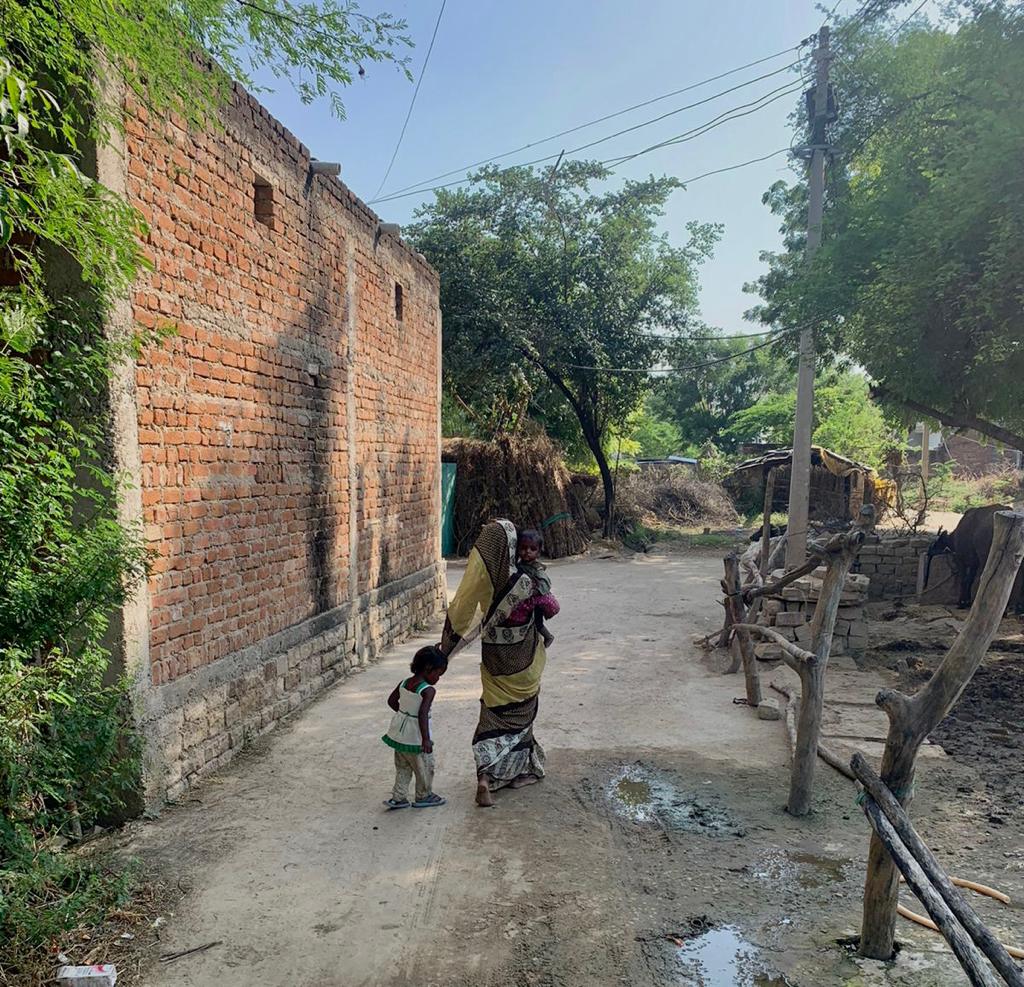


As part of The Antara Foundation’s (TAF) health interventions, we regularly assist the frontline healthcare workers during the weekly Village Health, Sanitation and Nutrition Day (VHSND). During this day, the community can freely interact with the healthcare workers and gain basic health services and information at the Anganwadi Centre (childcare centre).
On VHSND, an Auxiliary Nurse Midwife (ANM) administers vaccines to children under 5 years. In addition, she is supported by the ASHA and Anganwadi Worker who perform the necessary antenatal checkups for pregnant women and give counseling to pregnant women and those identified under high-risk pregnancy (HRP). Typically, a woman who comes under HRP lies at a heightened risk of having a complicated delivery – endangering her life as well as that of her child.
I first met Amrita, a 20-year-old mother, at a VHSND in Kishorpura village, in Madhya Pradesh’s Morena district. The village, predominantly occupied by the Adivasi community, is known for cases of early marriage leading to adolescent pregnancy. On the behest of the ASHA, Amrita, a mother of two, had come to the Anganwadi Centre for her monthly health checkup. She entered the Anganwadi along with her 4-year-old daughter tugging at her yellow saree, and her 3-month-old son clinging onto her arms.
As per the due list, a list prepared by the frontline workers that contains the names of all beneficiaries needing to be vaccinated on that day, Amrita’s son was to be vaccinated. But to our surprise, she was against the idea of her child being vaccinated. On closer scrutiny, we realized that Amrita’s husband, who is an alcoholic, hits her when their child starts crying due to fever – a typical bodily reaction to the vaccine. It is this fear of being physically abused that made her apprehensive of getting her child vaccinated. Despite active counseling by the ANM and ASHA, Amrita declined and retreated home – with both her children still clinging to her.
After the end of a long day at the Anganwadi Centre, the ASHA, Anganwadi worker and I headed to see Amrita. Having located her home – a dilapidated mud house with splashes of blue paint – we spotted her, playing with her children on their verandah.
Upon seeing Amrita, the Anganwadi worker sat next to her and patiently started to counsel her on the benefits her child will have in the long run. After a prolonged conversation, Amrita reluctantly agreed to her son getting vaccinated. She then turned towards her house – wanting to change her clothes before coming with us to the Anganwadi Centre.
Sitting on the charpai, we felt happy having conducted a successful counseling session. Five minutes passed. Then another five. Slowly, the realization dawned on us, that maybe Amrita had left the house without our knowledge. After entering from the front side, we saw the backdoor open. At a distance, we could see her running away and instantly, almost comically, all of us started running behind her. After a sprint that lasted for about 300 meters, we saw her entering her neighbor’s house. To our relief, the neighbors were receptive to the idea of getting Amrita’s child vaccinated – and actively advised her to receive the right vaccination at the right time.
Another round of negotiations began with Amrita, this time accompanied by the community, to explain the importance of vaccination for her child. After asking and quizzing us on many questions on the aftereffects of the vaccine, she finally agreed – only this time looking fully convinced. A counseling session led by the frontline workers, TAF and most importantly the community, had finally managed to convince Amrita to vaccinate her child. It truly takes a village to raise a child!
ANM Sunita Prajapati says “We try our best, but it is very hard for us to convince women in this community to attend the VHND. Just like Amrita, there are many women in the village who are victims of domestic violence. If the husband’s sleep is disturbed due to their child’s constant crying, the women end up facing a violent husband.”
A recurring issue for women like Amrita, who often receive little to no support (both emotionally and financially) from their families, is lack of proper documentation. This results in them not having a bank account, which paralyzes the process of women receiving the benefits of schemes like Janani Suraksha Yojana (JSY) and Pradhan Mantri Matra Vandana Yojana (PMVVY).
These schemes are aimed at improving safe motherhood interventions by providing partial wage compensation, so that the pregnant woman can take adequate rest before and after delivery. Like Amrita, many of the women in the village have little to no access to education and finances and thus, lack control over their own lives. This endangers their health and wellbeing. For women, availing such schemes becomes critical for availing proper treatment and care.
Despite the many challenges the frontline healthcare workers face, they actively continue to counsel the women from the community on the importance of healthcare and various government schemes. It is through the consolidated efforts of the primary healthcare workers, the AAA, ANM, ASHA and AWW – that important Maternal Child Health and Nutrition (MCHN) services are provided to women like Amrita. For Amrita and her child, getting the right vaccination at the right time serves as a testament to the efforts put in by the healthcare workers.